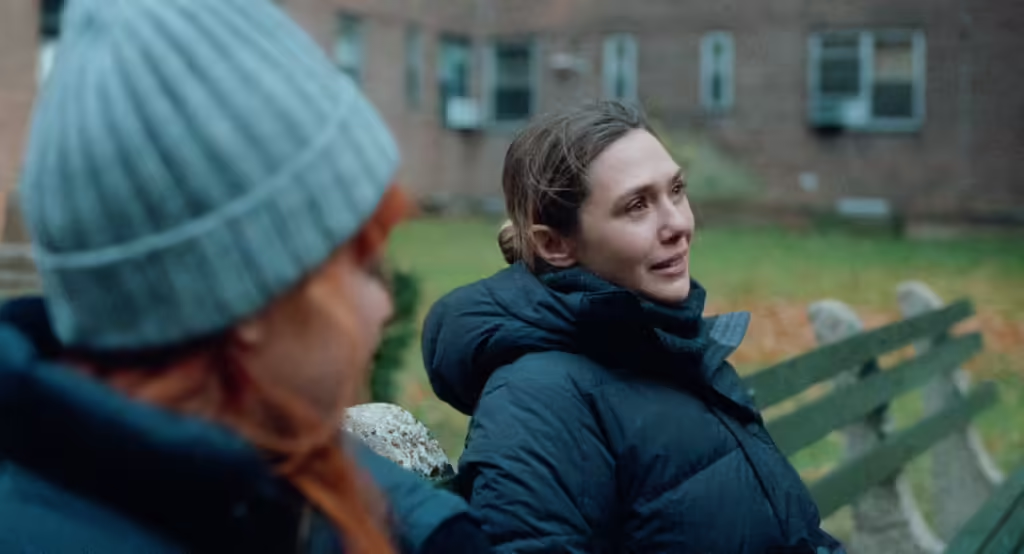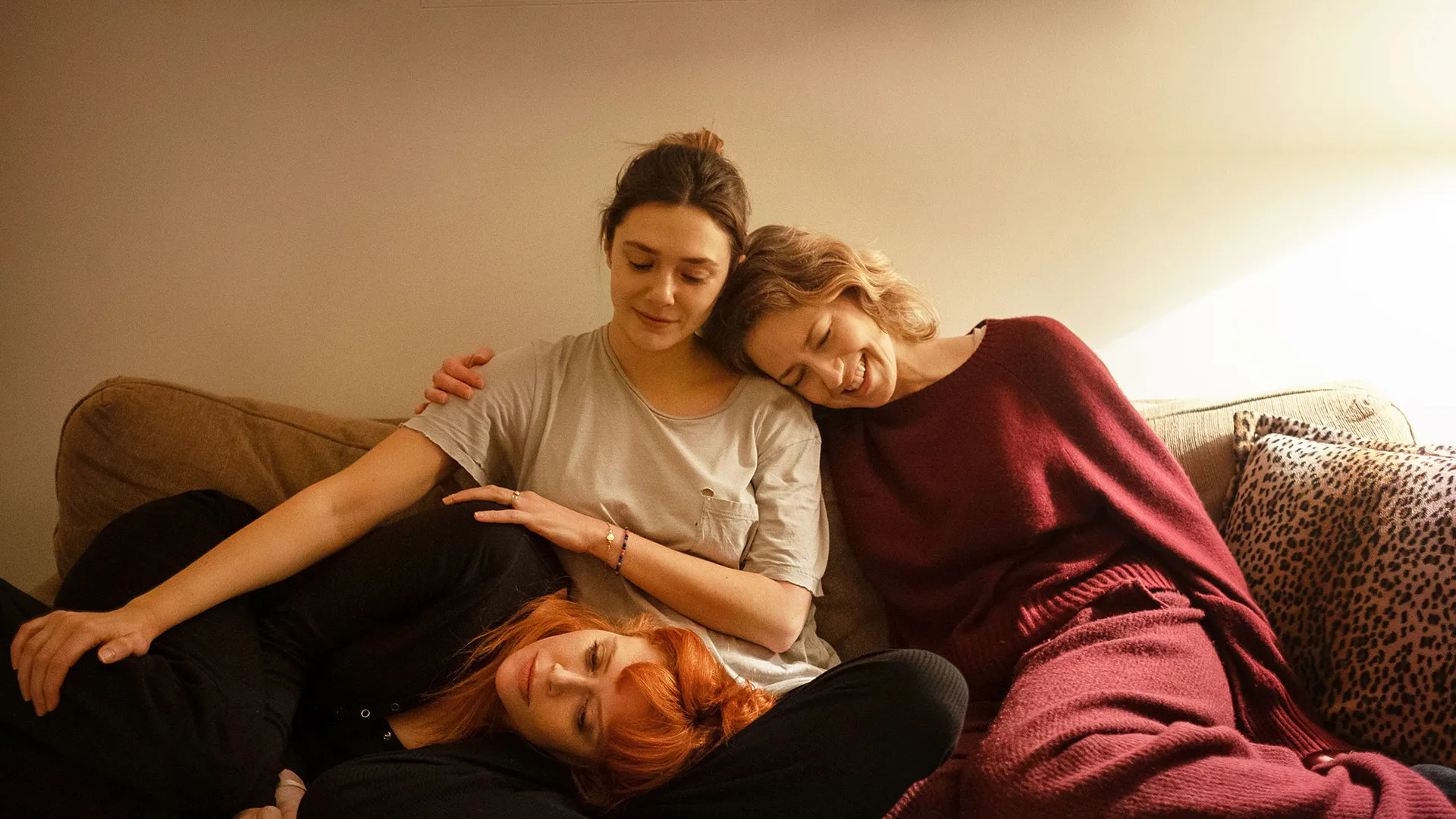In Azazel Jacobs’ intelligent, affecting His Three Daughters, a trio of wayward adult siblings gather for the most painful of reasons—to navigate their stricken father’s waning days. It’s a premise worthy of Ingmar Bergman, and the movie, a confined chamber piece featuring open-wound turns from Carrie Coon, Elisabeth Olsen and especially Natasha Lyonne, is a sometimes sad, sometimes amusing examination of the tenuous bonds between adult children, especially once their parents have left the building. Is there, Jacobs asks, anything remaining to hold them together?
Not much, at least at first glance, and Jacobs has written three very different, very smart women with one thing in common—the father with whom each still has a deep well of memories. Eldest daughter Katie (Coon) is the uptight, caustic Brooklyn mother to a troubled teen, residing across town from her ailing father’s Manhattan apartment but rarely visits, mostly due to ongoing inflammation with flame-haired individualist sis Rachel (Lyonne), who lives with their declining dad and is set to inherit the rent-controlled apartment upon his passing. Rachel spends her time betting on pro sports teams and keeping her distance from alienated Katie. Third sister and former Grateful Dead groupie is seemingly content California wife and mother Christina (Olsen), who returns home to New York to find her hands full mediating her eternally warring sisters.
Jacobs’ premise hinges on these three adult strangers locked in a ticking-clock countdown with a pair of hospice workers (Rudy Galvan, Jasmin Bracey) who advise that their father’s death is imminent. That father is unseen but looms largely from a bedroom at the end of the hall, bedridden and in and out of consciousness. This leaves the daughters to while away the hours wrestling with the messy mechanics of life’s end, including writing an effective obituary and desperately trying to finalize dad’s “do not necessitate” order, a declaration unsigned prior to his incapacitation. Just being in the same room together dredges up all sorts of deep-seated family resentments. While controlling Katie needles Rachel at every turn over her incessant smoking and is quick to proclaim how inappropriate she finds her sister’s every move, private Christina tries to keep an even keel. At one explosive juncture, their rising conflicts turn physical. During another, the terrific Jovan Adepo, playing Rachel’s no-nonsense supportive pal, confronts Katie’s imperious barbs.
Taking place almost completely in and around the cramped apartment finds Jacobs (French Exit, The Lovers) exploiting its tensely close quarters with effective theatricality (indeed it could work well onstage), which makes His Three Daughters foremost an actors’ treat. He has also shrewdly cast three very different performers with as much diametrical opposition as their three onscreen counterparts, so stepped in dysfunction they must may not come to terms. Jacobs’ screenplay is richly insightful in charting their passive-aggressive resentments, ranking with the best of 80s’ Woody Allen—think Hannah and Her Sisters—in its intricate confrontations.

Those confrontations sizzle with the best kind of acting, each actress tearing into Jacobs’ pointed dialogue, which is frequently, blackly funny, their performances suggesting different women—bound by blood but not by like or temperament—who love their father but not necessarily each other, forced into an agonizing sojourn.
Coon (Gone Girl, The Nest), whom I was lucky enough to catch at Chicago’s Steppenwolf in (husband) Tracy Letts’ incendiary 2020 Bug revival, is a tightly coiled ball of anxiety. The trick of her performance, which is highly theatrical and vocally mannered, is in watching the actress ever so slowly reveal the sad, disappointed person beneath the demonstrative demands. For her part, Olsen has the more straightforward role but performs with direct focus. Her Christina may have the least baggage but suffers in silence, including a brief late film moment thoughtfully composed by cinematographer Sam Levy to suggest infinite separation (a wall becomes a center-frame bisection).
But the always idiosyncratic Natasha Lyonne—one of the movies’ great, cynical, deadpan realists—steals the movie as the raspy voiced, chain-smoking outcast Rachel, tough as nails until the armor breaks to reveal a wounded heart. There probably isn’t an actress more comfortable in her own skin than Lyonne, and her performance style—smartest in the room confidence, free of technique, spontaneous—that separates her from Coon’s immaculate detail and Olsen’s warmth. Lyonne initially suggest a young woman who appears out of control and on the fringe before believably revealing herself a fiercely devoted caretaker of real substance. It’s a beauty of a lived-in performance.
The movie slips slightly on an unexpected final sequence, both affecting and unnecessary, Jacobs throwing his carefully calibrated sisterhood dilemma a curve with an unexpected narrative device slightly daring but more distracting. Some will find it transcendent and others bewildering. Regardless, it’s an audacious, brief detour from the tiny apartment’s psychodramas.
His Three Daughters will land on audiences to varying degrees, whether as a smart actors’ exercise or a personal connection to family trauma and the singular experience of losing a parent. Jacobs has crafted an incisive, regenerative story about whether ties really do bind and how sometimes just saying what’s in one’s heart, at the right time, has tremendous healing power, especially true in damaged families where siblings have turned into complicated adults who can’t relate. The film’s notion of what it takes to move on—to another dimension, from the past and in our own lives—is profound.
Throughout, Jacobs effectively uses the sound of a beeping heart rate monitor that is frequently audible, even outside. His movie has a big one.
His Three Daughters opens theatrically on September 6 and streams on Netflix September 20.
3 stars



